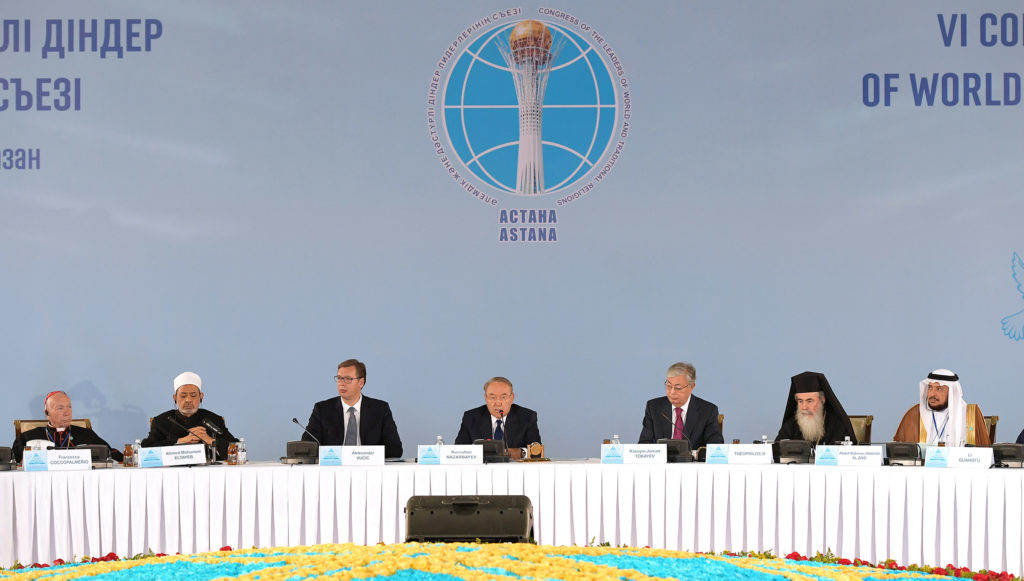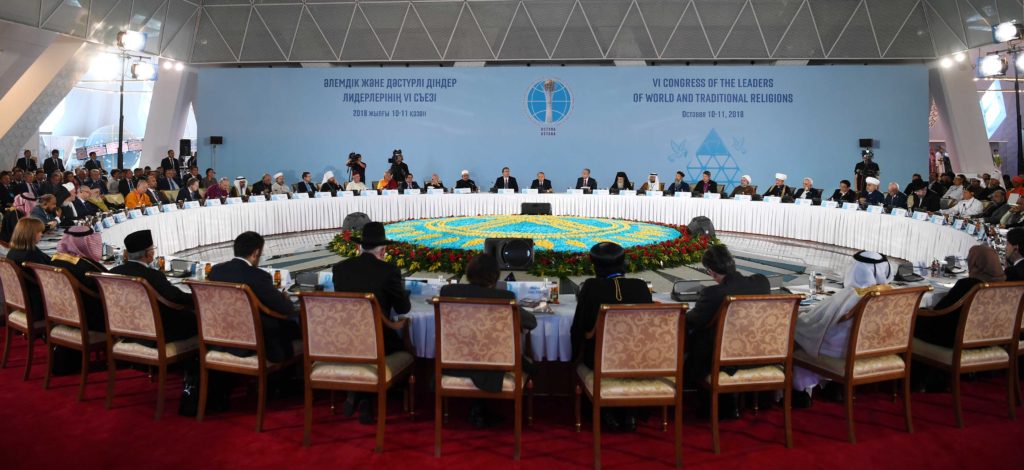Remarks by H.E. President Nursultan Nazarbayev of Kazakhstan at the opening of the Sixth Congress of Leaders of World and Traditional Religions
Palace of Peace and Harmony, Astana
Dear participants of the Congress and guests!
I am sincerely happy to welcome you to Kazakhstan
Your Eminences and Congregations!
Excellencies!
Dear participants and guests of the Congress!
Ladies and Gentlemen!
I am sincerely happy to welcome you to the hospitable land of Kazakhstan.
Let me express my deep gratitude to the spiritual leaders, representatives of international organisations, politicians and experts for supporting our initiative to convene the Congress and for personally participating in its work.
15 years have passed since the first historic Congress was held here.
Today we are gathering for the sixth time.
I am very pleased to see our old friends again –those that participated in previous meetings.
I am also glad to welcome those who are visiting Astana for the first time.
This year our capital is celebrating its twentieth anniversary.
The Congress of Leaders of World and Traditional Religions can be considered its hallmark, since we built Astana as a Eurasian city of the future, open to all cultures.
The well-known principle of “unity in diversity” is the true philosophy of the Kazakh capital.
Astana has become known to the entire international community as the place that attracts peace-making processes and unifying initiatives.
Our capital is characterised by a special spirit of solidarity, mutual respect and tolerance.
In the three years since the last Congress, important global events have taken place in the capital of Kazakhstan. The decisions adopted in Astana had a wide international resonance, since they were instilled with the idea of peacekeeping, partnership, tolerance, creation.
All of this is especially important since the world, to our great regret, has entered a turbulent state. All of us, including politicians, and religious leaders, cannot but be concerned by the use of sanctions, inter-religious and intra-religious conflicts, trade wars, environmental pollution.
Inter-civilisational conflicts look absurd against the backdrop of scientific and technological progress. But at this very moment the shape of the future of humanity is being formed. In what condition will we pass on our common planet to future generations – this is the main civilisational problem.
We have already been living in the third millennium for 18 years, but peace, prosperity and wealth have not become the main trend of human development. The world community has not been able to get out of the sinister circle of mutual distrust, hostility and conflict.
We see that the situation has worsened.
New walls, new “iron curtains” are being built between countries and geopolitical blocks.
But the most dangerous issue is that in the minds and hearts of people, a feeling of mutual estrangement is increasing.
Great efforts are being made to look for reasons for rivalry, rather than for foundations for cooperation, to create means of destroying each other, rather than to create joint projects for the prosperity of nations.
Let’s face it: this is a deeply erroneous, dead-end path. Therefore, our common duty is to facilitate a return to the highway of progress.
Postponement is unacceptable here, because humanity is paying for it an incredibly high price every day – the fate of innocent people.
Hundreds of thousands, millions of people are forced to leave their homes, countless others go missing. The number of refugees has exceeded 65 million people.
Losses grow not only because of direct conflicts.
Spending effort and resources on confrontation, humankind cannot use them to protect against natural disasters.
Every year, as a result of natural disasters, an average of 24 million people fall below the poverty line.
Millions of people are forced to leave their homes.
Despite the rapid technological development and growth of global wealth, the scale of social disasters continues to expand.
According to the UN, 14% of the world’s population is persistently malnourished.
The total number of unemployed has exceeded 190 million people.
This reinforces social inequality as a breeding ground for radicalism.
For this reason, the central issue is a safe, fair world.
Taking an active part in the work of the UN Security Council as a non-permanent member, Kazakhstan is fully and unequivocally in favour of taking urgent measures to solve global problems hindering human progress.
However, a safe world cannot be achieved only by the efforts of the UN Security Council.
Today, all of us, including religious and public figures present in this room, as well as politicians, must do their bit to overcome the global crisis of confidence.
Naturally, spiritual leaders should speak out.
You represent religions, which are all unique.
However each religion fully recognizes universal human values, the unity of moral principles.
I am sure that it is the spiritual principle, woven from a multitude of beliefs, faiths and ideals that should give impetus to the unifying processes.
Faith in the benevolence of the Almighty rests on a sincere desire for peace-making. A person with conflicting thoughts on this issue will never become a true believer.
The five previous Congresses held in Astana have convincingly confirmed the vitality of the idea of mutual respect and constructive cooperation of leaders of different cultures, religions and societies.
This has been demonstrated by the experience of Kazakhstan.
Despite the fact that most of our citizens consider themselves to be Muslims, this does not interfere with the freedom of other religions.
More than 3.5 thousand religious places of worship of 18 different faiths are registered in Kazakhstan.
With such diversity, we were able to find a balance between ensuring national security and protecting religious freedoms.
In our country, it must be noted, it was possible to establish a special Kazakhstan model of interfaith peace and harmony.
I am sure that the experience and practice of Kazakhstan can be applied on a global scale.
Our joint work will bring tangible results in ensuring peace, progress and the well-being of citizens of many countries.
Dear participants and guests of the Congress!
Let me share a vision of the areas that we can focus on together.
Firstly, in the era of the information age, we must take full advantage of new technologies in order to promote the ideas of peace and harmony at the global level.
To this end, I propose to create an information portal on the basis of our Congress.
The goal of the Portal is to assist in the study and implementation of methods to strengthen resistance to any manifestation of religious radicalism and violence in general.
It can become a platform for working with an audience of believers in a global format.
Each believer will be able to contact the leaders of religious organizations and confessions with a question or a suggestion and receive feedback.
Secondly, we are not using enough of the enormous potential that lies in our aspirations for peace.
It is necessary to reach for a new level of interaction.
We are talking about the use of the enormous potential of spiritual leaders and religious organizations to establish a constructive dialogue between conflicting parties.
I suggest to all spiritual leaders to appeal to the world community for peace and security.
It could be packaged in the form of a fatwa, encyclical, or another message and appeal, which will be relevant to a particular religion.
One of the global problems of our time to this day is the lack of affordable education.
750 million people globally can neither read nor write.
Poverty and misery cannot be overcome without substantially utilising knowledge and science.
Education is the basis of sustainable immunity to the ideas of radicalism in all its manifestations.
Religious education in this context is also extremely important.
Currently various pseudo-religious organisations are actively using this platform.
Therefore, world and traditional religions could work to separate religious values from political ideologemes.
Fourthly, the success of the modernisation of the global security system depends on the ability of the world community to overcome militaristic thinking and the dangerous anachronisms associated with it.
It is necessary to leave in the past the division of countries into military blocs, the existence of which becomes provocative and meaningless.
I set forth my vision of global anti-war measures in the Manifesto “Peace. XXI Century”, which proposes the creation of a world without nuclear weapons on the 100th anniversary of the United Nations.
If the international community, including religious leaders, will support the actions we are proposing, then this goal is attainable.
Kazakhstan traditionally works to restore and strengthen trust between states.
As you know, we are making our own contribution to resolving the Syrian conflict, including by providing a platform for negotiations.
Kazakhstan will continue to make maximum effort to address issues related to regional and global security.
In order to jointly implement the initiatives I have proposed, I am ready to establish the Centre for the Development of Inter-Confessional and Inter-Civilisational Dialogue.
We must work together to achieve a safer world and a fairer world order based on the authority of international law.
Dear friends!
I would like to once again draw your attention to the overall task that needs to be solved by our joint efforts – to switch the paradigm of global thinking from confrontation to cooperation.
To move from forceful egoism, social nihilism and economic nationalism to a responsible search for reasonable compromises.
To reverse the processes of total division, and not let it pass the point of no return.
I fully understand the scale of this goal.
But at the same time I realize the power that spirituality has.
Religion has always been a fundamental force shaping culture and social relations.
And now the world has entered a qualitatively new dimension, where the role of religions and its chosen leaders will be crucial.
The clash of civilizations is not a fatal choice.
It is in our power to change it. We must unite all our aspirations in search of a harmonious world order.
Earlier in the history of humankind there were no analogues to building bridges between religions, as is currently the case in the 21st century.
Our forum is a fundamentally new system of cooperation between spiritual hierarchs and politicians.
Today we are once again presented with a unique opportunity to share our vision of global prospects for harmonious development.
I hope that this meeting will enrich the practice of international and religious engagement with innovative ideas and fresh proposals.
I want to wish everyone fruitful work, an open and useful dialogue and positive decisions.
In conclusion, I would like to inform you about the decision to present the first prize of the Congress for the contribution to the interfaith dialogue to the Pontifical Council of the Vatican.
We are really grateful to the Holy See for the huge and useful work in supporting our forum. I would like to present this award in your presence.
In addition, a number of religious leaders were awarded state awards and commemorative medals of the Congress. On my behalf, they will be handed over to you by the Head of the Secretariat of the Congress, the Chairman of the Senate of the Parliament of Kazakhstan, Kassym-Jomart Tokayev.
Thank you for your attention.


